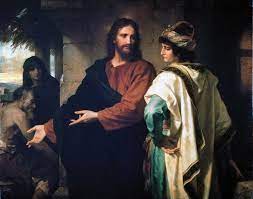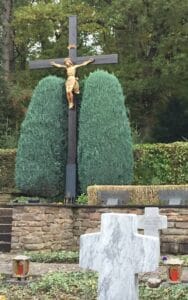Today we remember the deceased. They preceded us into eternity. We know from the Catechism of the Catholic Church how important it is to pray for the deceased, but is that all? Doesn’t it come spontaneously to our mind… am I prepared for that moment? Jesus says in the Gospel that death will come like a thief in the middle of the night. This means that I know neither the day nor the hour. Reflecting on the question that the young man asks Jesus can help us to fully experience the present moment, because our future depends on it, especially the decisive encounter with God in the last moment of our life.
The questions that accompany us throughout life
There are many questions in my heart. Questions that have to do with this life, with my fears and my longings, with my dreams and my expectations. Important questions. I hope, perhaps, for answers that will change everything.
Today I welcome in my soul the question asked of Jesus, “At that time, as Jesus was going out for a walk, someone came running and knelt before him and asked him “Good Teacher, what must I do to obtain eternal life?” 
That is the important question. Along the way there are questions that have to do with the present, with my daily life: What must I do to be happy now? How can I make the people I love happy on this day? What do I need for my soul to feel fulfilled? These are matters of everyday life. They exist in the present and awaken my senses to this day, without thinking about tomorrow. But still, the subject of eternity looms over my life. It is like an open question. […]
Sometimes, when I hear this question asked by the wealthy young man, it seems to me that he is looking for a recipe. Something like a road map to reach the correct destination; an exact and perfect compliance with all the precepts of God’s law. And it bothers me to ask myself this question, or to have someone else ask me. Perhaps I should repeat more often the antiphon of the Psalm so as not to forget God’s face, whom I seek and love: “Fill us, O Lord, with your love.” I see, then, that the wealthy young man’s question is poorly formulated. “What must I do?” It is almost as if he wants to know exactly what steps he must take to get to heaven. As if life were an exact science.
I have seen many times people obsessed with complying. Not to live happily in the present, but to inherit eternal life. They look for recipes, an exact plan to follow and fulfill. Father Joseph Kentenich once commented: “There are those who seem to have as their only task in life to follow the rules all day long. This observance certainly has a profound meaning, but only when placed in context. There is more to it than mere justice which simply states: it’s done! Let everything have love as its backdrop and main motivation. Love will help in the fulfillment of each prescription, for love’s sake”[1].
Essential is the love
I have found, then, the key to fulfillment: love. It is not a matter of doing things, but of doing them out of love. Everything derives from this. It is not a matter of doing things for the sake of doing them. It is not about remaining barely on the line that separates the virtuous from the sinners. The answer is different. It is about my love surging in everything. That when I pray, it is out of love. That when renouncements and sacrifices are asked of me, I give them out of love. I will be judged, on the last day, for the love I showed, not for complying exactly with everything.
The problem is that love is not so clear in its demands. It is not a straightforward set of rules, with clear exceptions and possibilities. Love is much deeper and truer. It reaches beyond the horizon, it has no limits.
Where do I feel my love is heading today? I certainly want to live eternal life, I want to inherit it, I want to possess God’s love forever. But I want to that journey to emanate from love, from what I am, from my truth. What do I have to do?
I am not always sure of the answer. I can very well distinguish between good and evil, between the things that make me grow as a person and the things that make me wither, between what makes me generous and what makes me selfish. In those moments, there is no doubt: I do not fear, I act. I opt for love and it works.
But suddenly I am full of doubts. I must choose between one good and another possible good. Where does God want me at this moment? What does God want me to do with my life? Should I follow this path or the other one? In those moments of uncertainty, I shiver and doubt. I feel heavy burdens on my shoulders.
Where does God speak to me?
Where does God speak to me? This is the most valid question that arises along the way. Between two possible goods, between two paths of holiness before my eyes: which one do I choose?

I cannot rely on a script. The recipes that have been proposed to me are of no use to me. At this point, I must simply search my heart calmly and rationally to find God’s will, to see where God will make my life more fruitful with the knowledge that, whatever I choose, God will not abandon me, he will be with me in my decisions.
I do not know if my choices will be the right ones, I do not know if the other path would have been the one preferred by God – perhaps only in heaven will I know. Nevertheless, I am certain that if I humbly sought the good for which I opted, as a child open to the will of God, and firmly believed it led this or that way, in that moment of clarity, I must be convinced that God accompanies me and blesses each of my steps. That gives me great peace.
[1] Kentenich Reader, volume 2: Studying ourFounder, Peter Locher, Jonathan Niehaus.
Homily by Father Carlos Padilla Esteban on October 14, 2018.
You can also read: Practical Faith in Divine Providence

